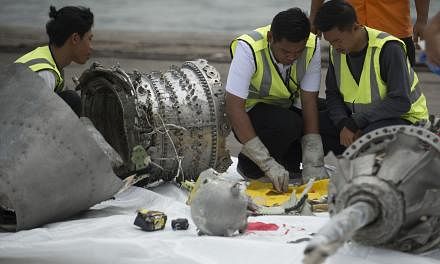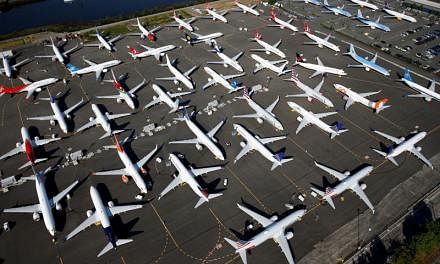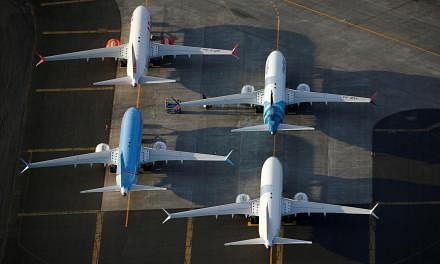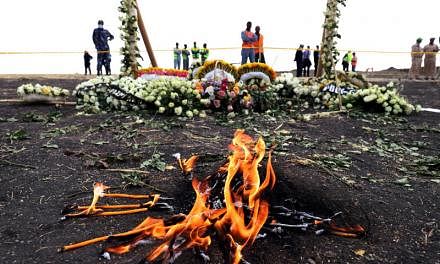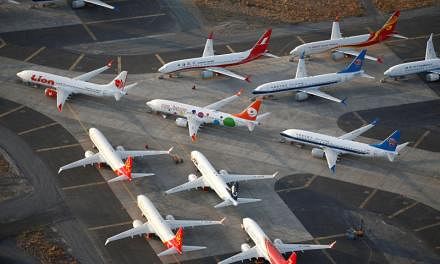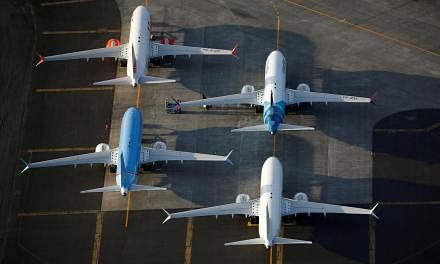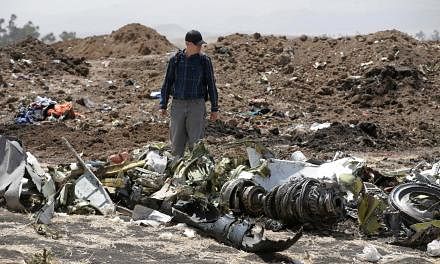NEW YORK (NYTIMES) - The Ethiopian Airlines plane crash that killed 157 people on Sunday (March 10) has rattled travellers around the world.
Just six months ago, the same model of airplane - a Boeing 737 Max 8, operated by Lion Air - crashed off Indonesia and killed all 189 onboard.
While the cause of Sunday's tragedy remains undetermined, and the investigation into the Lion Air accident is continuing, several circumstances of these two crashes are similar.
The 200-seat Boeing 737 Max 8 has been a popular plane since it came on the market in 2017, with more than 4,000 planes ordered within the first six months.
The plane sold quickly based on features that passengers crave - a quieter cabin, more legroom - and bottom-line benefits to airlines, like fuel efficiencies.
The plane's entry into the market seemed like the rare win-win for both passengers and airlines.
At the time of the Ethiopian Airlines crash, nearly 350 Boeing 737 Max 8s were in operation around the world, including in the United States.
In the wake of the Ethiopian crash, some countries and airlines announced they would ground Boeing 737 Max 8 planes.
China and Indonesia were the first countries to do so, almost immediately, while at least 22 airlines around the world made similar announcements.
But at least 12 other carriers, including American Airlines and Southwest Airlines continued to fly them on Monday, and the Federal Aviation Administration has not ordered their grounding.
To help travellers understand how to determine what plane they are scheduled to fly on, and their rights if they decide they do not want to board a Boeing 737 Max 8, we talked to airlines, passenger-right advocates and airline experts:
1. HOW DO I KNOW IF I AM FLYING ON A BOEING 737 MAX 8?
For most travellers, the information about their plane type is available at the time of booking, either during the seat-selection process or elsewhere online.
Experienced travellers - and especially those who frequently book longer flights - often head to FlightStats.com or SeatGuru.com to determine their planes.
Even if passengers determine which type of plane they are booked on, airlines might change planes at the last minute, as required by logistics or a change of weather.
By Monday, some people had taken to Twitter, saying they had cancelled flights or calling for all airlines to ground any Boeing 737 Max 8s in their fleets.
2. IF I WANT TO CANCEL A FLIGHT SCHEDULED ON THIS PLANE, WHAT ARE MY RIGHTS? COULD I GET A REFUND OR A FREE FLIGHT ELSEWHERE?
Mr Henrik Zillmer, the chief executive of AirHelp, a company that partners with Travelocity to help travellers make claims against airlines, thinks passengers are probably out of luck.
"Travellers can cancel their flights, but would not be eligible to claim compensation if they decide to do so," he said. "They do not have a right to compensation or reimbursement for tickets purchased as it is technically their decision to cancel."
If, however, you are booked on a flight with an airline that has grounded its Boeing 737 Max 8 planes, Mr Zillmer believes you will probably be refunded your fare.
"Since this situation would be a result of mechanical issues and therefore the airline's own fault, travellers may be eligible to claim compensation," he said.
Critically, though, what compensation is due and the laws that protect passengers depend on the departure airport and the home country of the airline.
If you are on a flight in or out of the European Union, or operated by a European Union-based airline, Mr Zillmer notes that EU regulations may entitle you to compensation of up to "US$700 (S$949.42) per person".
If you are flying elsewhere in the world, though, you might not have another option; many routes operate on limited timetables, and in some cases, there isn't an option to change to another flight.
3. WHAT ABOUT FLIGHT INSURANCE?
Mr Paul Hudson, the president of Flyers Rights, a passenger advocacy group, says even insurance might not help in these circumstances.
"Insurance would probably protect against government or airline action grounding delays, but not passenger election to change flights," he said.
"If your flight is cancelled or excessively delayed by the airline, you can get an involuntary refund of what you paid for that flight even if the ticket is labelled non-refundable," he added.
Ms Julie Loffredi, manager of media relations for InsureMyTrip.com, a travel insurance comparison site, said that "fear" is usually not a good enough reason for insurers to pay compensation to travellers who cancel their flights.
"With traditional, standard travel insurance you wouldn't be able to cancel and get your money back out of fear," she said.
However, since the 9/11 terrorist attacks, more flyers have purchased coverage that allows for any cancellation, whatever the reason.
4. WHICH AIRLINES HAVE GROUNDED THEIR BOEING 737 MAX 8 PLANES, AND WHICH HAVE NOT?
Cayman Airways in the Cayman Islands has grounded its two Boeing 737 Max 8 planes. Ethiopian Airlines has grounded its remaining four. The Civil Aviation Administration of China grounded all 97 of the country's domestic Boeing 737 Max 8s. Indonesia followed suit, and so has Singapore.

